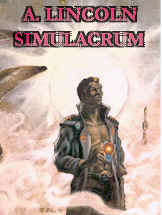

| Previous | 114 | Next |
| The Electric Ant | Chronology | Cadbury, The Beaver That Lacked |
 |
 |
(1969 Nov)(1970 Jan): AMAZING {GC 4th: "with 3,000 word ending written by Ted White"}{Levack: "Illustrated by Mike Hinge"} |
![]()
PKDS-6 8:
Dear PKDS,
I'd been wondering when the Apel/Briggs interview with Phil Dick would crop up in the Newsletter. I was shown a copy of this interview in ms. form in 1979 or 1980 and I was disturbed at the time by the wholly erroneous description of the events surrounding the publication of WE CAN BUILD YOU in Amazing as "A. Lincoln, Simularum." I write now in an effort to set the record straight, although my disappointment with Phil has worn off since his death.
The original title of the novel was THE FIRST IN YOUR FAMILY, and I believe it was the first novel Phil wrote after his foray into mainstream novels, circa 1958-60 -- essentially the first of the "modern" Dick sf novels which Phil produced in such a spate in 1960-64. It was the only first-person-narrated novel, and it had one rather major problem, a problem which had kept it from selling for ten years before I bought it: it had no ending. It didn't resolve.
{...}
I'd heard about the novel, as he says, from someone at Scott Meredith -- maybe from when I worked there (1963), or perhaps later, I no longer recall -- and when I became editor of Amazing I asked for it. Scott was glad to send it out; it had been unsold for ten years by then, perhaps the only remaining unsold sf property of Phil's. I read it and realised what the problem was, and I asked Phil about two things: changing the title (to "A. Lincoln, Simulacrum," my choice) and adding an ending.
Now to put this into context I must point out that I had met Phil in 1964, lived in his house, had him read the I Ching for me (a startling experience, the validity of which I believe to this day), and had been publicly described by Phil as the man who knew his work and understood it best. In 1965 or 1966 he had given me the first fifty pages and the synoptic essay for DEUS IRAE and asked me to finish it for him. In other words, this was a man who professed admiration and respect for me and wanted me to collaborate with him. (As a jape, he gave Penguin a photo of me and it was printed [as a photo of the author] on the back cover of the British THE MAN IN THE HIGH CASTLE.)
So I called Phil up; he had no objection to my proposed title change and he suggested I write the ending to the novel. I counter-suggested that I write a first draft and send it to him for him to rewrite, and he agreed. So I wrote a somewhat off-the-wall final chapter in skeletal form. I expected Phil to either reject it out of hand or rewrite it and flesh it out. He did neither. He returned it to me with three words changed and praised its economy.
As far as I knew when I ran "A. Lincoln, Simulacrum" it was in a form satisfactory to Phil. Because I considered myself a friend of Phil's, I tried to do more for him. I knew the novel had been rejected by every market that had seen it, and that undoubtedly included Ace (his original publisher), but ten years had passed and now it had an ending, so I gave a copy to Terry Carr, who was then editor of the Ace Specials. He didn't like it, but passed it on to Don Wollheim -- who had rejected the original version -- who also refused it. However, after Don went to DAW he must have had second thoughts, because he bought it for DAW and published it under a third title, WE CAN BUILD YOU --sans my ending.
{... ...}
{Ted White>PKDS, nd}
SL:38 289
Dear Bruce Gillespie:
{...}{...}
I know only one thing about my novels. In them, again and again, this minor man asserts himself in all his hasty, sweaty strength. In the ruins of Earth's cities he is busily constructing a little factory that turns out cigars or maps or imitation artifacts that say, "Welcome to Miami, the pleasure center of the world!" In A. LINCOLN, SIMULACRUM, he operates a little business that produces corny electronic organs -- and, later on, human-like robots which ultimately become more of an irritation than a threat. Everything is on a small scale. Collapse is enormous; the positive little figure outlined against the universal rubble is, like Tagomi, Runciter, Molinari, gnat-sized in scope, finite in what he can do ... and yet in some sense great. I really do not know why. I simply believe in him, and I love him. He will prevail. There is nothing else. At least nothing else that matters. That we should be concerned about. Because if he is there, like a tiny father-figure, everything is alright.
{...}
Cordially,
Philip K. Dick
{PKD>Bruce Gillespie, Sep 9, 1970}